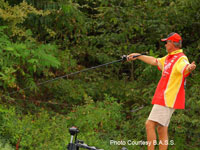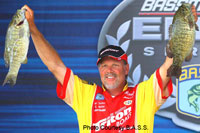Boyd Duckett's Keys to Winning Bass Tournaments
Decide to Win
 Editor’s Note: At the end of August, 2007, the 2007 Bassmaster Classic champion, Boyd Duckett of Demopolis, Alabama, won the B.A.S.S. Legends tournament and $250,000 at Arkansas’ Lake Dardanelle, bringing his total winnings in bass tournaments during 2007 to nearly $1 million. Never before has a tournament bass fisherman won as much money in as short a time on the B.A.S.S. circuit as Duckett. Besides finishing in the top-10 in eight, 2007 B.A.S.S. tournaments, Duckett also won the Ultimate Match Fishing Tournament, earning $76,000, and the Bassmaster Classic, earning $500,000. “I’ve won about another $115,000 this year in Bassmaster Tour Elite events,” Duckett says. At this writing, Duckett has wona total of $961,000 for 2007 and still has one tournament left to fish before the end of the year to possibly break the $1 million mark in one year from tournament winnings. He’s also currently in 10th place for Angler of the Year, which will pay about $20,000. Editor’s Note: At the end of August, 2007, the 2007 Bassmaster Classic champion, Boyd Duckett of Demopolis, Alabama, won the B.A.S.S. Legends tournament and $250,000 at Arkansas’ Lake Dardanelle, bringing his total winnings in bass tournaments during 2007 to nearly $1 million. Never before has a tournament bass fisherman won as much money in as short a time on the B.A.S.S. circuit as Duckett. Besides finishing in the top-10 in eight, 2007 B.A.S.S. tournaments, Duckett also won the Ultimate Match Fishing Tournament, earning $76,000, and the Bassmaster Classic, earning $500,000. “I’ve won about another $115,000 this year in Bassmaster Tour Elite events,” Duckett says. At this writing, Duckett has wona total of $961,000 for 2007 and still has one tournament left to fish before the end of the year to possibly break the $1 million mark in one year from tournament winnings. He’s also currently in 10th place for Angler of the Year, which will pay about $20,000. 
Question: What does an angler need to do or have to win?
Duckett: In my opinion, there are three elements to winning bass-fishing tournaments. To win, you have to spend enough time and accumulate enough skills in all the physical aspects of bass fishing – casting, retrieving, boat positioning, operating a trolling motor and understanding the workings of a depth finder. You haveto accumulate the knowledge of how to find and catch bass with different lures on various lakes in different climates and situations all over the nation. This treasure trove of information is my database. My database is built from all the bass-fishing experiences I’ve had in my life.
So, when I’m in a tournament, and I ask my database for the answer to finding and catching bass under specific situations, the answer is there. Now, many guys have fished all their lives and have very-complete databases. But to access that database and get the correct answer, you have to be able to forget abou t that database and let the answer come to you intuitively. At the level I’m fishing, tournaments aren’t really bass-fishing tournaments. They’re more like chess games played on the water. At this level, tournament bass fishing is 95% a mental game. t that database and let the answer come to you intuitively. At the level I’m fishing, tournaments aren’t really bass-fishing tournaments. They’re more like chess games played on the water. At this level, tournament bass fishing is 95% a mental game.
Question: Boyd, what percentage of the decisions you make are intuitive, and what percentage are learned?
Duckett: That’s a really-good question. The learned portion of my bass fishing is what’s in my mental database. However, to be successful, you have to make all of your decisions intuitively. I listen to that little voice inside of me and do whatever it tells me to do, even if that voice is telling me something to do that’s impractical and illogical for where I’m fishing. Listening to that voice is extremely d ifficult, and reacting to that voice at the very moment it tells you what to do is even more difficult. ifficult, and reacting to that voice at the very moment it tells you what to do is even more difficult.
Question: Why is that so hard?
Duckett: Because there’s so much information available about bass fishing. You can read and learn when bass should bite, that bass are shallow in the spring and deep in the winter and the summer, and that bass are in the grass in Lake Guntersville in Alabama. But truthfully, every day you fish, you need a completely-open mind, and you can’t make any of those assumptions. Then you have to listen to the bass. They’ll tell you where they are, and what they want to bite. For instance, you may be fishing in the spring, during the spawn, and know that everything you’ve read, seen or learned tells you that the bass will be shallow, trying to spawn. But by searching for the bass, you may pinpoint them in 30 feet of water, holding on a drop-off. The problem is that bass can’t read or watch television. They don’t know where they should be, according to everything that’s been written or said about bass fishing. Bass move to where they want to be based on many variables we don’t understand.
Tomorrow: Research Makes the Difference
|
